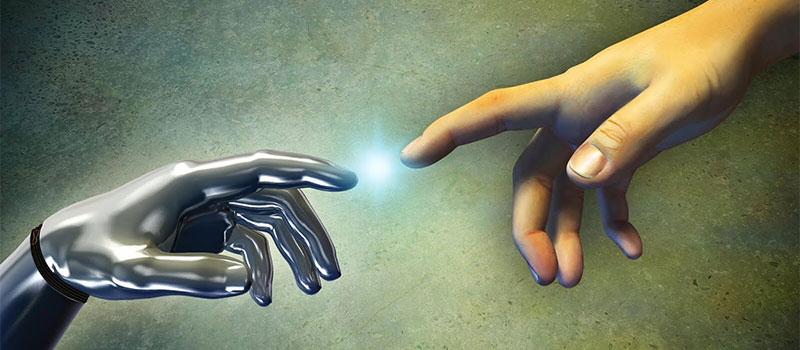LINKEDIN | 18 SEPTEMBER, 2017

A new human on the planet
We are drooling over the new human on the planet – AI. Together with other ideas like AR, IoT etc., our lives are poised to change. How much of it is for the better? What quantum of our brain function is being taken over by AI technologies? Are such technologies supplementary or substitutive in nature? With what consequences?
It is widely believed that we use only a small portion of the brain functionalities (even though the 10% figure is considered a myth) like cognitive, computational, memory, linguistic, planning, thought-generation aspects. Therefore, how does the grocery planner stuck on your refrigerator affect you? Sure, it saves a lot of ‘headache’ of planning, remembering and recall of what you have and what you need to buy. Most of us are at best 90% good at it, while the AI could make that percentage better. So what would we do with the saving in brain activity? Just this example gives rise to several issues that we cannot ignore.
- The brain will need to accept the reduction in its functioning. A lazier brain could lead to a number of things - physiological trauma, reduced memory functions, changes in onset of dementia (doctors advocate healthy, active brain and brain training to slow down the onset), realignment in the ‘left brain’ activities, changes to self-renewal properties of cells etc. We sometimes hate to accept mind-numbing lifestyle (at work or in other spheres). That’s the brain telling us how much it hates less work.
- We would descend to lazier work habits as a consequence of delegation to AI based systems. You don’t need to spend a few minutes reading the map anymore before a journey. You don’t need to turn off lights and air-conditioners when you leave home. You can afford to be slack in your alertness if your car is one that has no drivers. You find that you have more time and energy, but how would you spend that? Not all will consciously channel it to productive activities. We may end up with more Netflix and candy crush binges. Worse still, smokers, gamblers and alcoholics will fill the void in their characteristic ways.
- We run the risk of gradual loss of cognitive control – like how handwriting has started to lose its importance and spelling is now the responsibility of the computer. We need to do fewer things ourselves as we slowly start depending on the AI gadgets. It’s not very different from the feeling you get when you cede control to another member of your family of things you have done for decades – like walking your dog or managing your financial portfolio or tending to your garden.
- The beauty of mankind is that each one of is different. In future versions of AI application, there will be less scope and appreciation for Individual differences as our actions and routines resemble clones of some kind. Where is the power of human creativity? What exactly is artificial creativity? Even nature looks different at different times of the day and during different seasons. The human colours could be camouflaged undistinguishably in AI controlled regimes.
- Too much predictability takes away the charm of life. There may be only one standard way that certain things are done. Yes, there will be efficiency and zero errors. But who complained about mistakes in every day routines? Some of us will surely agree that missing a couple of items at the next grocery shopping trip is fine. We need the embarrassment to do better (if at all it is an embarrassment). We need those moments to laugh at ourselves. Ask driving aficionados about the pleasure of driving on weekends for a picnic or just a long, cosy drive. When robots are starting to ape humans, we may end up aping them!
- Internet, smart phones and social media constituted wave 1.0 of threat to face-to-face human interaction. People spend between 2 and 10 hours a day on these and all interaction is virtual. Wave 2.0 is here – bots and AI devices. As we can communicate with them, we are quietly substituting direct human interface. The current Gen Z and later will be exposed only to this form of interaction. We also become physically immobile, as a result of being able to do most things from our desks or sofas or beds.
The principle of AI meanwhile signals a great technological leap and deserves all the attention and investments that it attracts. However, that should be used for doing what we cannot do (due to over-complexity like quantum computing or human band-width problems) or what we do poorly. It shouldn’t take our place. As the feverish push of the technology to neural networks from behavioural algorithms continues, it is the perfect moment to pause and establish acceptable exploitation.


